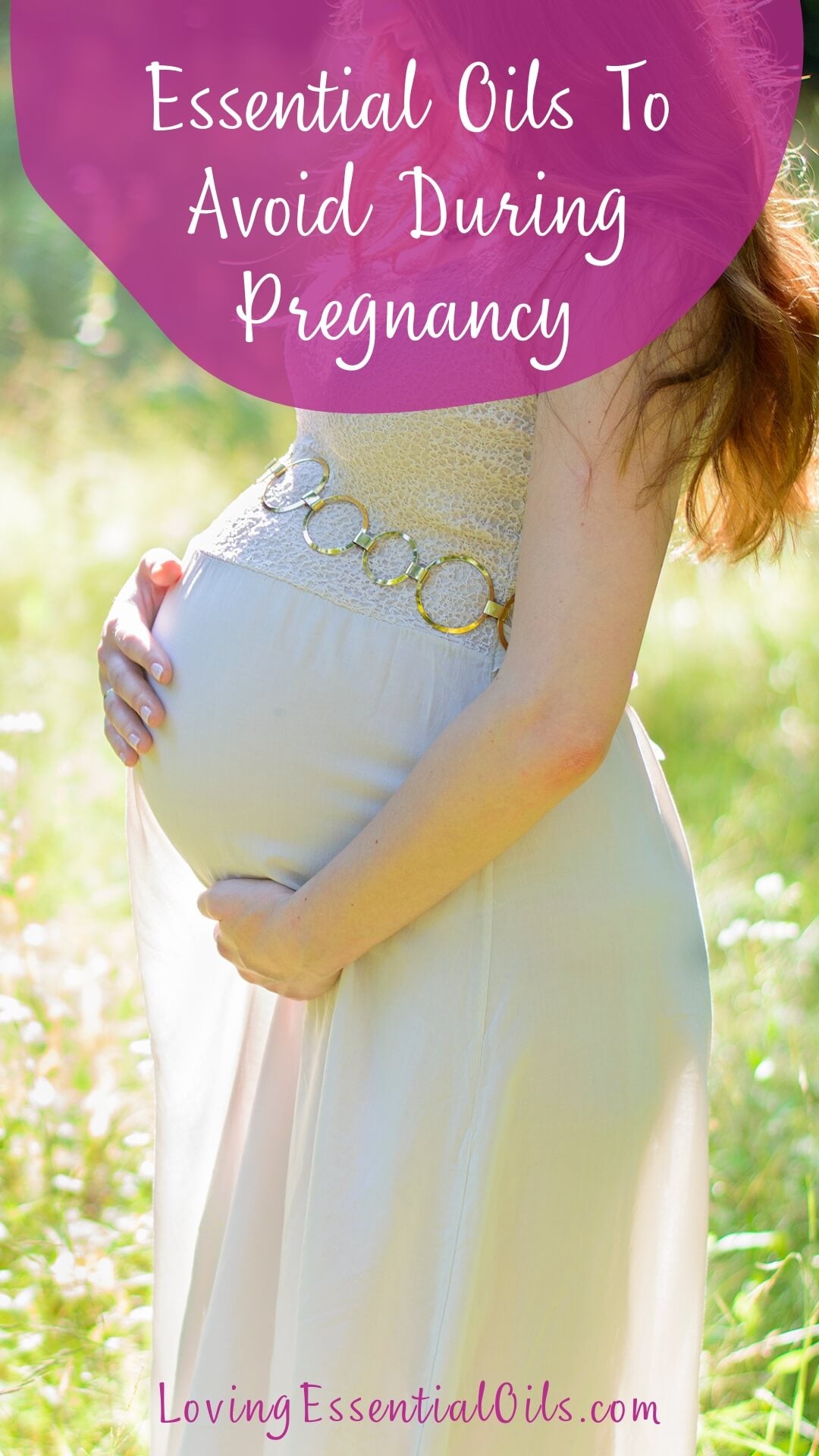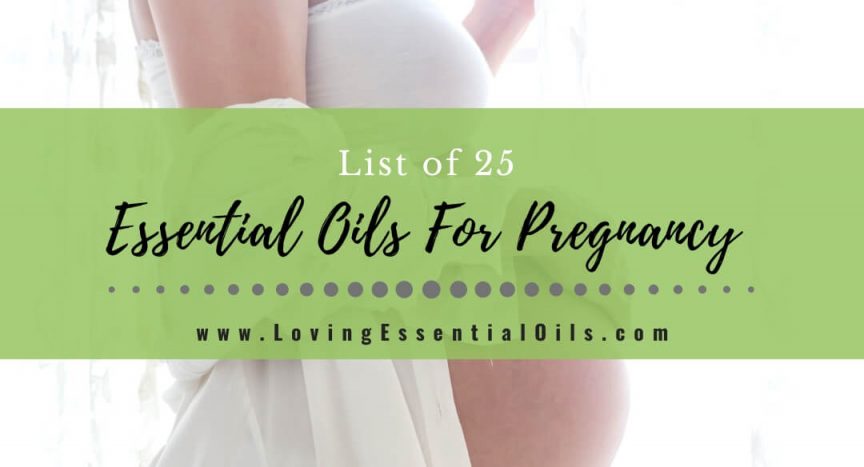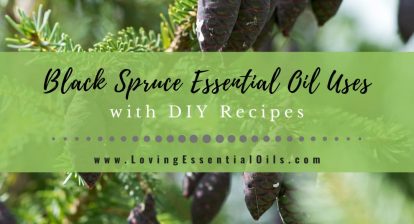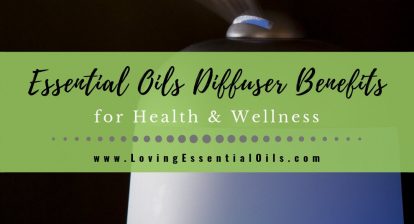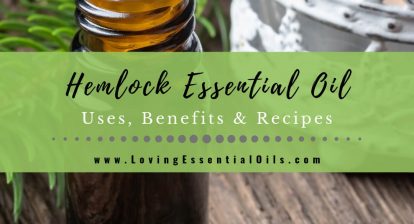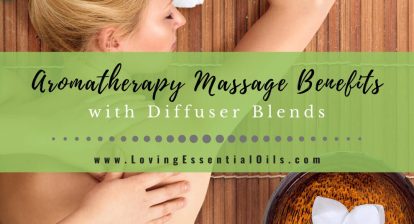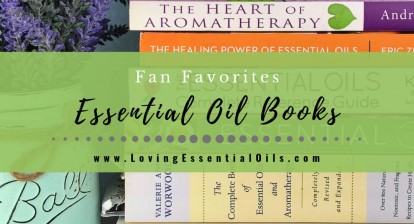During pregnancy a woman’s body goes through numerous stresses, strains, and hormonal changes. Essential oils can be helpful and supportive during this time. There is also much need for precautions when using essential oils during pregnancy. Here is a list of essential oils for pregnancy with some DIY recipes!
Essential oils should only be used topically (on skin) or aromatically (inhaled). When applying to skin, be sure to keep the dilution level at 1%, that equals 6 drops of essential oils to 1 ounce of carrier oil.
Aromatherapists agree that most essential oils should be avoided during the first three months of pregnancy. Here is what Valerie Ann Wormwood recommends:
“When a woman is pregnant, unless otherwise directed by a professional, it’s best to use the minimum quantities of essential oils and avoid all use during the first trimester” (from The Complete Book of Essential Oils & aromatherapy by Valerie Ann Wormwood, page 635).
List of Essential Oils For Pregnancy
Essential oils should be used very cautiously during pregnancy and while breastfeeding. The regular, daily use of essential oils while pregnant is not advised. It is best that essential oils be used on an as needed basis.
The user should be aware of the safety precautions for the oils too. Everyone reacts differently so use caution.

Here is a list of 25 essential oils that can cover many problems, pregnancy related or not:
1. Bergamot Essential Oil (Citrus bergamia)
Uses: Infections, fevers, indigestion, cystitis, wounds, acne, depression, stress, tension, insomnia, fear, emotional crisis (The Complete Book of Essential Oils and Aromatherapy by Valerie Ann Wormwood, page 571).
2. Black Pepper Essential Oil (Piper nigrum)
Uses: Aches and pains, stomach cramp, digestive problems, rheumatism, circulatory conditions, chills, exhaustion (The Complete Book of Essential Oils and Aromatherapy by Valerie Ann Wormwood, page 572).
3. Cardamom Essential Oil (Elettaria cardamomum)
Uses: Indigestion, intestinal cramp, gas, nausea, gastric migraine, constipation, gastrointestinal disorders, muscular cramp and strains, muscle spasm, bronchial congestion, exhaustion, mental fatigue (The Complete Book of Essential Oils and Aromatherapy by Valerie Ann Wormwood, page 575).
4. German Chamomile Oil (Matricaria chamomilla)
Uses: Acne, allergies, boils, burns, cuts, dermatitis, earache, eczema, inflammations, insect bites, rashes, toothache, wounds, arthritis, inflamed joints, muscular pain, neuralgia, rheumatism, sprains, dyspepsia, colic, indigestion, nausea, headache, insomnia, nervous tension, migraine and stress related complaints (The Encyclopedia of Essential Oils by Julia Lawless, page 70).
5. Roman Chamomile Essential Oil (Anthemis nobilis)
Uses: Muscular spasms and contractions, rheumatism, menstrual cramp, rashes, acne, eczema, psoriasis, skin irritation, inflammatory skin infection, sunburn, dental and teething problems, insect bites and stings, insomnia, anxiety, nervousness, depression, stress-related conditions (from The Complete Book of Essential Oils and Aromatherapy by Valerie Ann Wormwood, page 578).
6. Coriander Seed Essential Oil (Coriandrum sativum)
Uses: Digestive problems, flatulence, dyspepsia, bloating, indigestion, abdominal spasm, abdominal discomfort, irritable bowel syndrome, detoxifying, nervous tension, muscular fatigue, muscular aches and pains, mental fatigue, tired all the time, emotional exhaustion (from The Complete Book of Essential Oils and Aromatherapy by Valerie Ann Wormwood, page 582).
7. Tangerine Essential Oil (Citrus reticulata)
Uses: Stress, insomnia, exhaustion, muscle spasm, cellulite, digestive problems, gas, constipation, irritability, dispirited, anxiety (The Complete Book of Essential Oils and Aromatherapy by Valerie Ann Wormwood, page 625).
8. Rose Oil (Rosa damascena)
Uses: Female reproductive problems, infertility, menstrual irregularity, dysmenorrhea, menstrual cramp, circulatory conditions, acne, skin dehydration, scarring, premature aging, depression, anxiety, emotional anxiety, nervous tension, stress-related conditions (from The Complete Book of Essential Oils and Aromatherapy by Valerie Ann Worwood, page 618).
9. Manuka Oil (Leptospermum scoparium)
Uses: Bronchial infection, bronchitis, catarrh, coughs, influenza, skin infection, wounds, cuts, grazes, contusions, ulceration, H. pylori, fungal skin infection, athlete’s foot, parasitic infection, ringworm, mites, head lice, scabies (The Complete Book of Essential Oils and Aromatherapy by Valerie Ann Wormwood, page 603).
10. Mandarin Oil (Citrus reticulata)
Uses: Acne, congested and oily skin, fluid retention, digestive problems, dyspepsia, hiccoughs, intestinal problems, insomnia, nervous tension, restlessness, stretch marks and scars, skin spots, skin care toner, perfume, cologne, soap (The Encyclopedia of Essential Oils by Julia Lawless, page 131).
11. Neroli Oil (Citrus aurantium)
Uses: Insomnia, convalescence, indigestion, abdominal spasm, intestinal cramp, stress and related conditions, scar tissue, scarring, skin regenerating, acne, problematic skin, stretch marks, menopausal anxieties, insomnia, sleep disorders, nervousness, depression, tension, emotional exhaustion (The Complete Book of Essential Oils and Aromatherapy by Valerie Ann Wormwood, page 608).
12. Rosewood Oil (Aniba rosaeodora)
Uses: Acne and scars, dermatitis, wounds, wrinkles, general skin care, colds, coughs, fever, infections, headaches, nausea, stress related conditions, nervous tension, frigidity, stimulates immune system (The Encyclopedia of Essential Oils by Julia Lawless, page 175).
13. Grapefruit Essential Oil (Citrus paradisi)
Uses: Acne, oily skin, tones the skin and tissues, cellulitis, exercise preparation, muscle fatigue, obesity, stiffness, water retention, chills, colds, flu, depression, headaches, nervous exhaustion, performance stress (The Encyclopedia of Essential Oils by Julia Lawless, page 105).
14. Spearmint Essential Oil (Mentha spicata)
Uses: Colic, dyspepsia, nausea, flatulence, digestive upset, stomachache, neuralgia, muscle aches, nervous migraine, nervous fatigue (The Complete Book of Essential Oils and Aromatherapy by Valerie Ann Wormwood, page 622).
15. Sandalwood Essential Oil (Santalum album)
Uses: Coughs, sore throats, urinary infection, cystitis, vaginal infections, heavy legs, scarring, insomnia, anxiety, nervous tension, nervous exhaustion, depression (from The Complete Book of Essential Oils and Aromatherapy by Valerie Ann Worwood, page 620).
16. Sweet Marjoram Oil (Origanum majorana)
Uses: Muscle relaxant, muscle spasm and pain, general aches, numbness, bodily stiffness, abdominal pain, contusion, bruises, headache, gastrointestinal disorders, abdominal spasm, indigestion, intestinal spasm, constipation, insomnia, stress-related conditions, anxiety (The Complete Book of Essential Oils and Aromatherapy by Valerie Ann Wormwood, page 603).
17. Patchouli Oil (Pogostemon cablin)
Uses: Acne, athlete’s foot, cracked and chapped skin, dandruff, dermatitis, eczema, fungal infections, hair care, impetigo, insect repellent, sores, oily hair and skin, open pores, wounds, wrinkles, frigidity, nervous exhaustion, stress-related complaints (from The Encyclopedia of Essential Oils by Julia Lawless, page 161).
18. Geranium Essential Oil (Pelargonium graveolens)
Uses: Circulatory disorders, Raynaud’s disease, varicose veins, hemorrhoids, neuralgia, nervous skin disorders, depression, fatigue, emotional crisis, stress-related conditions (The Complete Book of Essential Oils and Aromatherapy by Valerie Ann Wormwood, page 591).
19. Sweet Orange Essential Oil (Citrus sinensis)
Uses: Dull and oily complexions, mouth ulcers, water retention, chilld, constipation, dyspepsia, spasm, colds, nervous tension, stress-related conditions (from The Encyclopedia of Essential Oils by Julia Lawless, page 153).
20. Tea Tree Oil (Melaleuca alternifolia)
Uses: Bacterial skin infection, parasitic skin infection respiratory tract infection, sinusitis, rhinitis, laryngitis, bronchitis, wounds, ulceration, pimples, acne, abscesses, head and body lice, fungal infection, athlete’s foot, warts, verrucas (from The Complete Book of Essential Oils and Aromatherapy by Valerie Ann Worwood, page 626).
21. Lavender Essential Oil (Lavandula angustifolia)
Uses: inflammatory conditions, skin infection, wounds, cuts, grazes, rashes, itching, stress-related eczema, nervous psoriasis, sunburn, burns, muscular spasm, muscular contraction, abdominal cramp, headache, migraine, insomnia, nervousness and related conditions, acne, pimples, insect bites, stress, tension, anxiety, tension, panic, insect deterrent (from The Complete Book of Essential Oils and Aromatherapy by Valerie Ann Wormwood, page 598).
22. Lemon Essential Oil (Citrus limon)
Uses: Acne, anemia, brittle nails, boils, corns, cuts, greasy skin, insect bites, mouth ulcers, varicose veins, warts, arthritis, cellulitis, high blood pressure, nosebleeds, poor circulation, rheumatism, asthma, throat infections, bronchitis, catarrh, dyspepsia, colds, flu, fever and infections (The Encyclopedia of Essential Oils by Julia Lawless, page 123)
23. Ginger Essential Oil (Zingiber officinale)
Uses: Arthritis, muscle fatigue, muscular aches and pains, poor circulation, rheumatism, sprains, strains, catarrh, congestion, coughs, sinusitis, sore throat, abdominal cramp, flatulence, indigestion, loss of appetite, nausea, travel sickness, nervous exhaustion (The Encyclopedia of Essential Oils by Julia Lawless, page 102).
24. Frankincense Essential Oil (Boswellia carterii)
Uses: Coughs, colds, bronchitis, nervous asthma, skin infection, scars, wounds, urinary tract infections, mental fatigue, depression, nervousness, stress, tension, inability to communicate (The Complete Book of Essential Oils and Aromatherapy by Valerie Ann Wormwood, page 589).
25. Petitgrain Essential Oil (Citrus aurantium)
Uses: Acne, excessive perspiration, greasy skin and hair, toning skin, dyspepsia, flatulence, insomnia, convalescence, nervous exhaustion, and stress-related conditions (from The Encyclopedia of Essential Oils by Julia Lawless, page 163).

How to Use Aromatherapy During Pregnancy and Childbirth
Use a few drops to relax your body and mind. You can ease your mind by taking a warm bath, and then diluting the essential oils in it. This is especially important for expectant mothers. Always use caution when getting in and out of bath, especially when oils are involved.
These oils can be used to ease the pains and tension caused by the day’s events or aches. You can also place drops in your shower to allow the oil to disperse with the steam. Warm water from the shower will help to leave a soothing scent.
Essential Oil Combinations
While many essential oils offer individual benefits, they can also be combined to provide a powerful combination. Combinations of essential oils can be more effective in treating mental problems and emotional imbalances. They can help with memory loss and irritability too.
Massage Blends
Massage oils can also be used with essential oils. A few drops of essential oils can be added to massage oils to enhance the massage, or you can make an aromatherapy massage oil at home.
This oil blends will help relieve tension and soothe sore muscles. The oils can be used on the scalp, temples, forehead and temples to create a relaxing effect that relieves headaches and refreshes the mind.
Aromatherapy for Stress and Anxiety Relief
Women who are pregnant are more likely to experience hormonal imbalances, which can cause anxiety and stress. Aromatherapy can be used to relax pregnant women and balance their emotions.
Inhale the aromatherapy scents, small amounts can be added to a bath or diffuser.
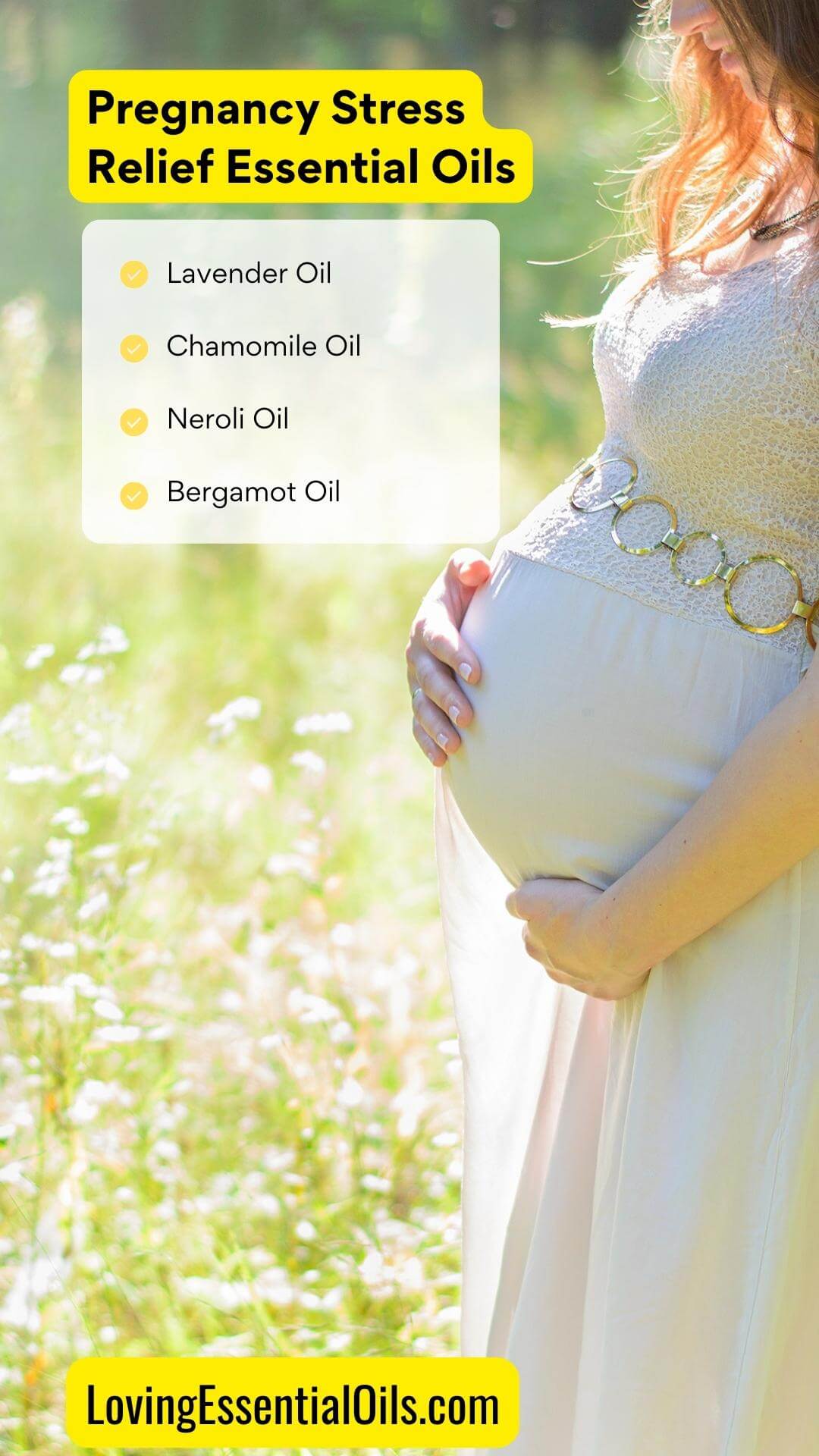
Essential Oils to Avoid for Pregnancy, Labor, and Breastfeeding
- Aniseed – Pimpinella anisum
-
Basil – Ocimum basilicum ct. estragole
- Birch – Betula lenta
- Camphor – Cinnamomum camphora
- Hyssop – Hyssopus officinalis
- Mugwort – Artemisia vulgaris
- Parsley seed or leaf – Petroselinum sativum
- Pennyroyal – Mentha pulegium
- Sage – Salvia officinalis
- Tansy – Tanacetum vulgare
- Tarragon – Artemisia dracunculus
- Thuja – Thuja occidentalis
- Wintergreen – Gaultheria procumbens
- Wormwood – Artemisia absinthium
List from NAHA safety guidelines
Some others to avoid included essential oils high in phenols, like these:
- Oregano – Origanum compactum
- Thyme – Thymus vulgaris ct thymol
- Clove – Syzygium aromaticum
- Cinnamon – Cinnamomum camphora
- Cumin – Cumimum cyminum
- Fennel – Foeniculum vulgare
- Anise Star – Illicium verum
Essential Oil Blends For Pregnancy Support
Are you pregnant and looking for some helpful essential oil blends to use? Essential oils are a great way to support your health and well-being during pregnancy, and they can be especially beneficial if you’re experiencing common symptoms like nausea or fatigue.
Let’s get started with essential oil recipes for pregnancy:
No Worries Roller Blend
Directions: Add oils into 10 ml Roller bottle and fill rest of bottle with jojoba oil (or favorite carrier oil). 1% dilution. |
No Worries Diffuser Blend
Directions: Add essential oils to diffuser with recommended water. Read more about diffusing essential oils. Diffuser for 10-15 minutes at a time. |
Backache Body Oil
Directions: Blend all ingredients together in bottle, apply small amount to achy area. |
Healing Bath
Directions: Stir oils together, add in Epsom salt and blend together. Pour mixture into filled bathtub, swirl with hand to blend. |
Relaxing Shower Drops
Directions: Place essential oil drops on washcloth and place the cloth into shower on shower soap tray. As the warm water hits the cloth, the aroma will fill your shower. |
Leg Cramps Foot Bath
Directions: Mix oils together, then stir in salt. Place blend into a bowl or basin of comfortably warm water, swirl water to blend, then place feet into basin. Allow feet to soak about 10 minutes. |
Stretch Mark Belly Oil
Directions: Blend all ingredients together in bottle, apply to belly as needed. |
Frequently Asked Questions About Using Essential Oils for Pregnancy
Expectant mothers go through a thrilling and wonderful experience that requires the utmost caution and care. Numerous expectant mothers rely on natural treatments to ease common prenatal conditions like queasiness, exhaustion, and anxiety.
Nevertheless, with so much discrepancy in the information found online regarding what oils are suitable for use during pregnancy, it can be difficult to evaluate the facts and fiction. Here are some common questions users ask.
Can I use essential oils during pregnancy?
Definitely! Essential oils can be a great aid for helping women during pregnancy, delivery, and even after childbirth. Generally, it is advisable to be particularly attentive during the initial three months (the first trimester) when the fetus’ most important organs are developing.
When used properly, essential oils can be of assistance in providing relief from common pregnancy issues including headaches, nausea and insomnia, and may even be utilized to reduce stress and pain during childbirth.
It is important to speak with a medical professional prior to utilizing in order to ensure the individual’s needs and circumstances are appropriately addressed.
What essential oils can be used during pregnancy for stress?
Aromatherapy is thought to be a harmless and natural approach to reduce stress and foster relaxation during maternity, making use of essential oils.
Here are essential oils that can help you relax throughout pregnancy.
Lavender Oil: Lavender is a relaxing scent that can help you relax your mind. Lavender can help you feel refreshed and relieve stress.
Chamomile Oil: It has a mild scent that calms both the mind and body. This oil is ideal for anxiety and irritability. This fragrance can be used in moderation to help with stress relief and emotional imbalances.
Neroli Oil: Neroli essential oil is a remedy for depression. It helps to remove negative thoughts and relaxes. It is also useful in treating stress-related illnesses such as insomnia.
Bergamot Oil: Bergamot can be used to improve mood and help with depression. The citrus aroma will lift your spirits and clear your mind.
How can essential oils be used during pregnancy?
Essential oils can be used during pregnancy to help support the body’s physical, mental and emotional needs. They can be used in a variety of ways including aromatherapy, massage, and topical application.
Aromatherapy is a popular way to use essential oils during pregnancy. Inhaling the aroma of certain oils can have calming and uplifting effects. Lavender and chamomile are often recommended for relaxation, while spearmint and ginger are said to help relieve nausea.
Massage is another way to use essential oils during pregnancy.
What essential oils are good for nausea during pregnancy?
Essential oils can be a great way to relieve nausea during pregnancy. Lavender, ginger, and spearmint are some of the best essential oils for relieving nausea.
- Lavender can help reduce nausea and vomiting, as well as calming the nervous system.
- Ginger is known for its anti-nausea effects, and it can be inhaled or applied topically.
- Spearmint can help reduce symptoms of nausea, and it has a refreshing aroma.
- Other essential oils that may help with nausea during pregnancy include lemon, chamomile, and cardamom.
It is important to note that essential oils must be diluted before applying to skin.
What essential oils are good for pregnancy stretch marks?
Geranium oil: With its balancing properties, geranium oil can help promote healthy skin and reduce the appearance of stretch marks over time.
Lavender oil: Known for its healing properties, lavender oil can help reduce the appearance of stretch marks and improve skin elasticity.
Frankincense oil: A powerful anti-inflammatory, frankincense oil can help reduce the appearance of scars and stretch marks.
Chamomile oil: This oil is known to be soothing and calming, which can help to reduce the itching and discomfort associated with skin stretching and healing.
Final Thoughts on Pregnancy Essential Oils
In conclusion, essential oils can offer a range of benefits for pregnancy when used appropriately. It’s critical to bear in mind that essential oils ought to only be employed sparingly during pregnancy, and only with the endorsement of your healthcare provider.
Usually, the use of essential oils in limited amounts and mixed with a carrier oil is thought to be safe for expectant mothers. Ensure to avoid the essential oils listed as unsafe and any essential oils that you have had any reactions to.
With a variety of options available, it’s important to consult with a healthcare provider or certified aromatherapist before using essential oils during pregnancy.
By following safety guidelines and choosing high-quality essential oils, pregnant women can safely and effectively harness the power of aromatherapy for improved physical and emotional wellness.
Share on Pinterest
